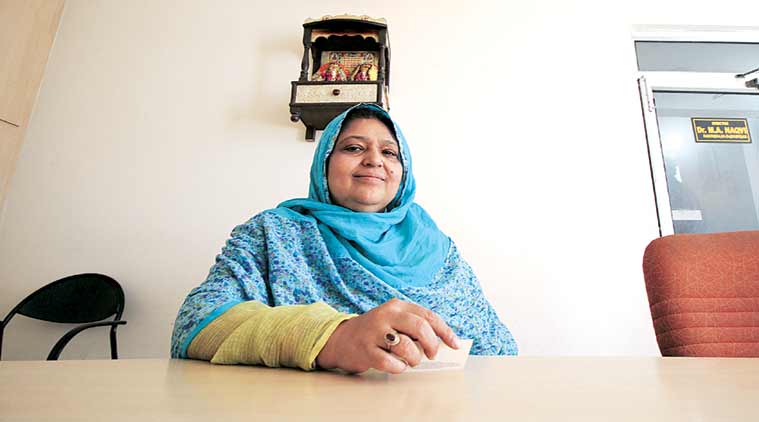- India
- International
Meet UP’s first women qazis: one is a professor, the other a science graduate
They are the first women qazis in Uttar Pradesh — and only the second in the country, after two women were appointed in Jaipur a few weeks ago.
 Hindu women have also sought help, says Hena Zaheer. Pramod Adhikari
Hindu women have also sought help, says Hena Zaheer. Pramod Adhikari
ONE IS a Shia, the other is a Sunni. One is 51 years old, married and a mother of two; the other is just 25, unmarried. Despite the seeming differences, Hena Zaheer and Maria Fazal have a lot in common. Both are well-versed in Islamic law, having studied the Sharia in madrasas — the reason why they were picked as qazis by a group of Muslim women on February 24.
They are the first women qazis in Uttar Pradesh — and only the second in the country, after two women were appointed in Jaipur a few weeks ago.
[related-post]
While matters related to Muslim personal law are now decided by the courts, the qazis still form an integral part of the community, acting as advisors and playing a crucial role in personal matters like solemnisation of nikah, talaaq and inheritance issues.
“We are working exclusively for women,” says Zaheer, the older woman. Besides working as an associate professor at the College of Management Studies in Lucknow, she also runs an NGO called Pahal. Fazal, a science graduate, runs a computer training centre.
The two women are also part of the All India Muslim Women Board set up in the city last year to voice concern against the “anti-women” interpretation of the Sharia.

“In the last two weeks, about a dozen women have come to us for help. Most of them complain about being ill-treated by their husbands and in-laws. We don’t advise them to go to courts, but ask them to try and solve the matter amicably. We try to convince the women to start working and become self-dependent,” says Zaheer, adding that they were also approached by two Hindu women for help.
She cites the example of a woman who has two children and is not willing to live with her husband, a drunkard who physically abuses her. “I asked the woman to start living separately for some time and try to learn some skills. We will take up the matter again and decide as per her experience of living separately… if she can survive without her husband,” she says.
Zaheer says the Quran does not allow dominance over women. “It says the one who does good work is going to be rewarded by Allah here and hereafter. The gender is irrelevant,” she says. She adds that the Islamic law gives rights to women, while it assigns duties to men. “A woman can even ask for payment for the household work she does,” she says.
They have also taken up the issue of “triple talaaq”, and have sought proper procedure, with adequate intervals between the three pronouncements, as defined under the Sharia.
“We have also been discussing the issue of mehr (money paid to bride by the groom). These days, very few men pay it… Sometimes, the amount is as less as Rs 11. What will a woman do with Rs 11 if she has to live alone,” says Zaheer.
Then there is the matter related to inheritance of property. The All India Muslim Women’s Board, which has over 100 members, recently prepared a report stating that in over 90 per cent cases, daughters do not inherit any property.
The duo, who work out of a one-room office in Chamanganj area of Kanpur city, faced their fair share of criticism, especially from male qazis.
One of them, Qazi Inamullah, terms the appointment of women qazis as a “drama”. “Women have an option of submitting their view through written applications to male qazis. The job of the qazi should be left to men. This is happening only in Kanpur, but nobody is going to them. It has not affected our work in any way,” says Inamullah.
But Zaheer’s husband, M A Naqvi, counters: “While two women were appointed as qazis in Jaipur a few weeks ago, there are women qazis in many countries like Indonesia, Jordan and Sudan.” He says various seminaries, including Darul Uloom Deoband, Darul Uloom Niswa of Mumbai and the Kichhauchha Sharif, have spoken in favour of women qazis.
Mohammad Salees, general secretary of the All India Sunni Ulema Council who has been a proponent of the move to appoint women qazis in Kanpur, says he has written to the All India Muslim Personal Law Board but is yet to receive a response.
“If you have been giving religious education to girls, why should they not be allowed to become qazis after gaining that knowledge. Most people fail to see that India is not an Islamic country, it’s a secular country. Here you have certain religious freedom. You are living 30 per cent of your life as per Islam and 70 per cent as per a secular Constitution. So why can’t you give similar freedom to women in the community,” he says.
Zaheer does not let the negative comments affect her. She says their role as qazis has been endorsed by the All India Muslim Women Personal Law Board. A city-based women’s organisation, Sakhi Kendra, has even offered to provide office space, she adds.
Looking at only the positives, Zaheer, a Shia, and Fazal, a Sunni, say their initiative is also helping to bridge the sectarian divide in the community.
Apr 26: Latest News
- 01
- 02
- 03
- 04
- 05







































